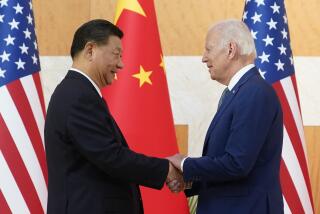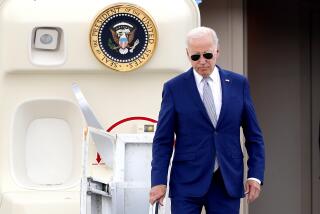Bush in Asia: Not Minding The Store, Or Our Interests
- Share via
Did President Bush go to Japan, China and South Korea just to have his picture taken? If so, he has demonstrated anew America’s increasing irrelevancy to Asia.
Beyond the welcome symbolic importance of attending Emperor Hirohito’s funeral (with the attendant opportunity to meet briefly with other world leaders), Bush would have been better advised to return home immediately to get on with the business of appointing officials and formulating policies.
The impact of the disorganization in Washington on America’s influence abroad was evident during Bush’s stops in Beijing and Seoul. In the Chinese capital, the President clearly thought he was on a nostalgic vacation trip to his former happy-hunting ground as U.S. ambassador. Meanwhile, his hosts treated him as another barbarian coming to pay tribute to the Middle Kingdom.
Zhao Ziyang, the Communist Party leader, told Bush that democracy threatened China’s stability and that reformists were undermining progress. To this Bush had no reply. Then the President went on Chinese television to praise the Beijing regime for its “freedom” and social reforms.
When Fang Lizhi, a noted Chinese dissident, was prevented by police from attending a Bush-hosted dinner, the President only “expressed his regret” to a deputy foreign ministry official as he boarded his plane the next day. Why did Bush bother to invite a controversial figure to dinner if he was not going to ensure that he could eat?
When Chinese security guards jostled a White House press photographer filming Barbara Bush (dislocating the photographer’s jaw, according to her fiance, White House Press Secretary Marlin Fitzwater), the First Lady explained that it was “just an accident.” In the only other major news, the world was treated to the spectacle of an American President endorsing closer relations between China and the Soviet Union. Whatever happened to the China card?
These all might be minor incidents except that they were the substance of his visit. For this, he had to pack his bags?
In South Korea for six hours, Bush had to be flown about by helicopter, in part to keep the tear gas out of his eyes while evading embarrassing demonstrations against American military and trade policies. Before the National Assembly, he told the Koreans to open their markets to American agricultural produce. Then he re-boarded Air Force One, leaving President Roh Tae Woo, governing with only 36% popularity, facing Korean nationalists incensed by American heavy-handedness.
This was the substance of the “new initiatives” that the President had boasted he was carrying to Asia. That he achieved his objective of strengthening “key relationships with our friends and partners in the Pacific region” is also questionable. Certainly Korea’s Roh must wonder.
Yet, even as Bush was in Asia, there were a number of important developments. The Chinese and the Indonesians ended more than 21 years of hostility and re-established relations. The second Jakarta meeting between Cambodian factions over a prospective peace settlement collapsed in recriminations.
These are just two of the dramatic changes occurring in Asia for which reaffirming the status quo is an insufficient policy. The United States needs policies and programs that will reinforce positive change in the region. An immediate example is the Cambodia peace process, to which the American role has been essentially limited to having our President’s picture taken with Prince Norodom Sihanouk while the Soviets and the Chinese engineer a condominium controlling Indochina behind our back. Where is American leadership in creating an international peacekeeping force to prevent the Khmer Rouge from returning to power?
The United States needs more than just a few picture post cards for the folks back home if it is once again to be the Pacific power in deed that George Bush so far has only alluded to in word.
More to Read
Sign up for Essential California
The most important California stories and recommendations in your inbox every morning.
You may occasionally receive promotional content from the Los Angeles Times.













